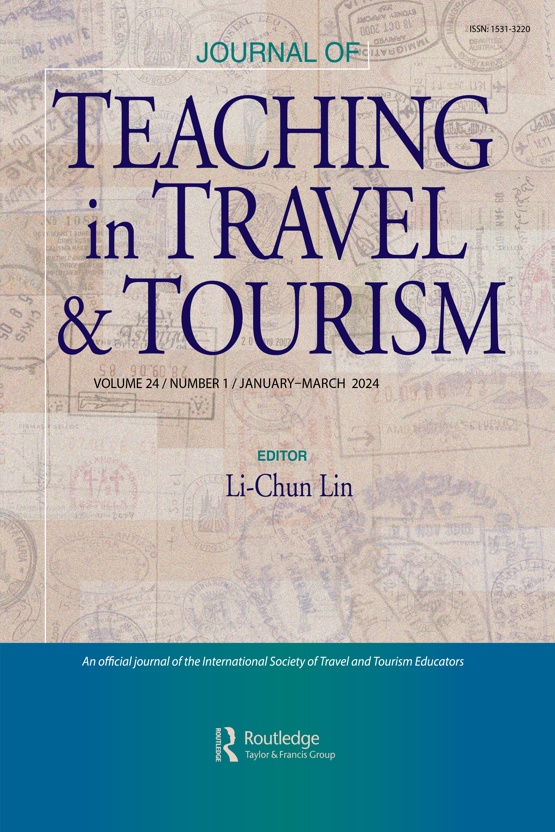Submit a Manuscript to the Journal
Journal of Teaching in Travel & Tourism
For a Special Issue on
Generative Artificial Intelligence in Events, Hospitality, Sports, and Tourism Education: Responsible Innovation for Industry-Ready Futures
Abstract deadline
Manuscript deadline

Special Issue Editor(s)
Dr. Ken Tsai,
Iowa State University, USA
kentsai@iastate.edu
Dr. Minwoo Lee,
University of Houston, USA
mlee37@central.uh.edu
Dr. Agnes L. DeFranco,
University of Houston, USA
adefranco@uh.edu
Generative Artificial Intelligence in Events, Hospitality, Sports, and Tourism Education: Responsible Innovation for Industry-Ready Futures
The Journal of Teaching in Travel & Tourism (JTTT) is pleased to announce a special issue focusing on the transformative role of Generative and Responsible Artificial Intelligence (AI) in Events, Hospitality, Sports, and Tourism education. This special issue seeks to explore the implications, opportunities, and challenges that AI brings to the teaching and learning environment in the Events, Hospitality, Sports, and Tourism domain, with a particular emphasis on responsible implementation and ethical considerations.
Generative AI technology is poised to revolutionize industries across economies, with hospitality and tourism education being no exception. It has the potential to address long-standing challenges in hospitality and tourism curricula, innovate teaching and learning practices, and accelerate progress towards more engaging, inclusive, and accessible educational experiences. Concurrently, the responsible use of AI in education is important to ensure ethical practices, maintain academic integrity, and prepare students for an AI-augmented industry.
While examples of generative AI integration in hospitality and tourism education are emerging, there is a pressing need to establish best practices, conventions, and standards for their responsible and ethical use. This special issue aims to contribute to this critical discourse by exploring theoretical foundations, methodological developments, and practical applications of generative and responsible AI in Events, Hospitality, Sports, and Tourism education.
This special issue invites original research, conceptual papers, research notes, teaching tips, and case studies that provide insights into the integration and impact of generative and responsible AI in the context of Events, Hospitality, Sports, and Tourism education. We encourage contributions that critically examine how AI is reshaping the pedagogical landscape, fostering new educational paradigms, and addressing the evolving needs of students and educators in this field. The topics will cover theoretical foundations, methodological developments, and the practical applications of generative AI for Events, Hospitality, Sports, and Tourism education. We welcome submissions on a wide range of topics, including but not limited to:
- Adaptive Curriculum Innovation through AI
- AI-Enhanced Custom Learning Pathways
- Generative AI in Creative Processes
- Bias Mitigation in AI Tools
- Navigating Ethical AI
- Responsible AI Implementation Frameworks
- Immersive Learning with AI-Driven Simulations
- Future Skills for an AI-Augmented Industry
- Predictive AI for Career Trajectory Analysis
- Predictive Analytics for Student Success and Retention
- Predictive AI for Tourism Trends: Integration into Curriculum and Industry Preparedness
- AI as a Catalyst for Global and Cross-Cultural Learning
- Transforming Distance Learning with AI
- AI-Powered Assessment Strategies
- Empowering Educators with AI: Professional Development
- Redefining Events, Hospitality, Sports and Tourism Education in an AI-Dominated Future
- Human-AI Synergy and Ethical Considerations
- The Role of AI in Crisis Management and Resilience Building
- Accessibility and Inclusion through AI
- AI for Sustainability Education
- AI in Service Innovation Education
- AI Literacy and Professional Development Frameworks
- Responsible Use of Large Language Models (LLMs) in Academic Research and Assessment
Submission Instructions
- Authors are invited to submit their abstracts (up to 500 words) via Qualtrics survey by April 30, 2025, and will be notified the result by June 1, 2025. The survey can be accessed here: submit your abstract. (If the above doesn’t work, use this link: https://iastate.qualtrics.com/jfe/form/SV_8p6baZPHPka4uQC)
- The abstract should clearly outline the relevance of the study to generative and responsible AI in hospitality and tourism education, including a brief introduction, research questions and/or hypotheses, methods, expected results, and discussions on theoretical contributions and practical implications.
- All submitted manuscripts will be assessed by the Guest Editors who will determine suitability for review at JTTT. All submissions will undergo a rigorous double-blind peer-review process.
- For any inquiries, please contact Dr. Ken Tsai at kentsai@iastate.edu. We look forward to your valuable contributions to this special issue, which will help shape the future of Events, Hospitality, Sports, and Tourism Education in the era of generative and responsible AI.
Manuscript Types and Word Limits:
- Full Research Paper: Up to 8,000 words
- Research Note: Up to 4,000 words
- Case Study with Teaching Note: Up to 5,000 words for case study only
- Teaching Tips: Up to 4,000 words
Important Dates:
- Abstract Submission Deadline: April 30, 2025
- Notification of Selected Abstracts: No later than June 1, 2025
- Full Manuscript Submission Deadline: October 1, 2025
- Notification of Acceptance and Revisions: Following peer review
- Publication: 2026
